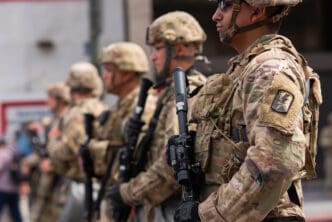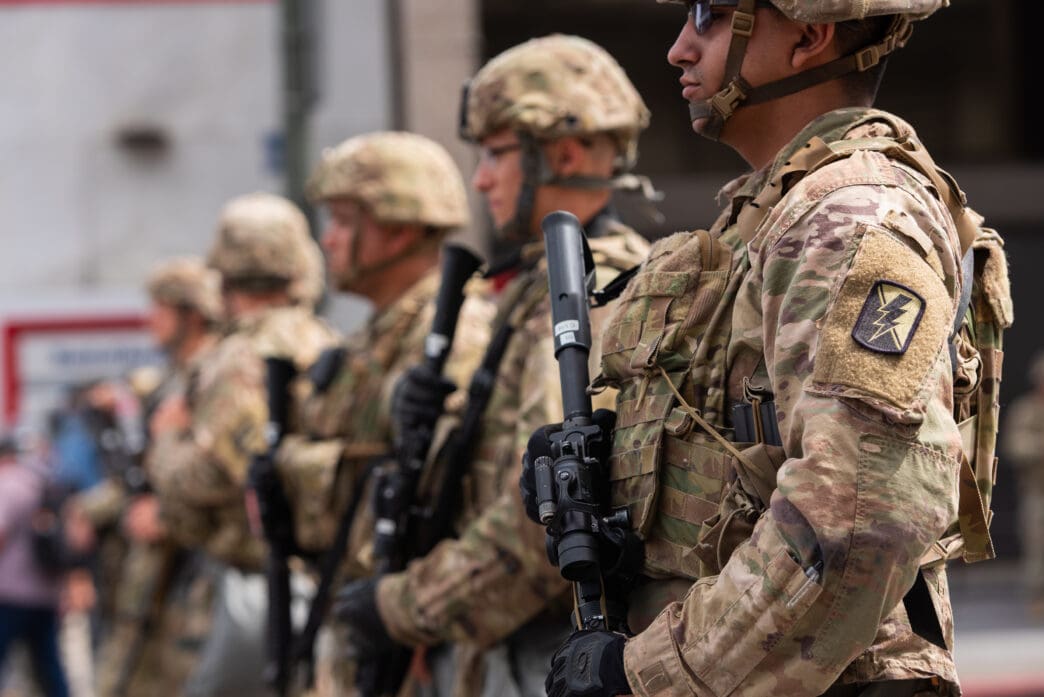Executive Summary
The Story So Far
Why This Matters
Who Thinks What?
President Donald Trump has formally authorized the deployment of at least 300 Illinois National Guard members to Chicago for 60 days and is pursuing similar actions in Portland, Oregon, intensifying a constitutional standoff with Democratic city and state officials. These deployments, which the administration states are aimed at addressing crime and immigration concerns, are encountering significant legal and political challenges. Critics argue that these actions represent an unprecedented federal overreach into domestic law enforcement, potentially creating a constitutional crisis.
Federal Deployments and Legal Challenges
The administration’s latest actions involve sending National Guard reservists into two Democratic-led cities, Chicago and Portland. In Chicago, President Trump authorized the deployment of Illinois National Guard members, with additional reservists from Texas being placed under federal control and directed to the city. City and state authorities in Illinois have responded by suing the administration to halt these deployments.
In Oregon, a Trump-appointed judge has temporarily blocked the administration’s attempt to take control of reservists or to send reservists from California to Portland. Amid these legal setbacks, President Trump warned on Monday that he would invoke the rarely used Insurrection Act if judges continued to impede his plans.
Rhetoric and Reality in Urban Security
President Trump has consistently described Portland, Chicago, and other American cities as “war zones” akin to Afghanistan, citing issues of crime and homelessness. White House adviser Stephen Miller has used strong language, claiming that ICE officers in Portland have faced “over 100 nights of terrorist assault” and “murder threats.”
However, local officials present a different picture. Oregon Democratic Senator Jeff Merkley stated that protests around the ICE facility were sporadic and confined to a single block, often escalating when federal forces engaged protesters. An Oregon federal judge, appointed by President Trump, also characterized the administration’s alarmist declarations of an emergency in Portland as “untethered to the facts.”
Mayor Katrina Thompson of Broadview, a Chicago suburb, accused federal agents of creating “chaos” by deploying crowd control measures during protests against ICE operations. Critics suggest that the administration’s rhetoric aims to create an impression of disorder, building a political justification for more extreme federal interventions.
The Insurrection Act and Presidential Authority
Under most circumstances, federal law prohibits the president from using military troops for domestic law enforcement. The Insurrection Act provides an exception, allowing such deployments to quell a rebellion against the government. Historical uses include President Dwight Eisenhower enforcing civil rights laws and President George H.W. Bush responding to Los Angeles riots, both of which involved requests or agreements from state governors.
Oregon Attorney General Dan Rayfield, a Democrat, asserts that current conditions do not meet the criteria for invoking the Insurrection Act, stating, “We don’t have a rebellion here in Oregon, we don’t have an insurrection, we don’t have an invasion.” Despite this, administration officials like Stephen Miller argue that opposition to federal immigration operations constitutes an attempt to “overthrow the core law enforcement function of the federal government,” describing it as “the textbook definition of domestic terrorism.”
Political Motivations and Public Opinion
The administration’s actions are seen by some as aligning with President Trump’s “Make America Great Again” philosophy and his “I alone can fix it” mantra. The deployment of troops, particularly alongside immigration officers, could expedite mass deportation efforts and project an image of a strongman leader, a consistent feature of his political persona.
The Department of Homeland Security has also adopted hardline rhetoric, with social media posts claiming arrests of “hundreds of criminal illegal aliens, terrorists, and terrorist sympathizers” in Portland and Chicago, and calling for job applicants to “block communists, terrorists, and globalists.”
These tactics are believed to energize President Trump’s base ahead of midterm elections, especially among Republican voters who support military deployments to cities, viewing them as crime-reducing and safety-enhancing measures. However, a recent poll indicated that 58% of all Americans oppose President Trump’s plans to involve the military in domestic law enforcement, suggesting a potential political backlash.








